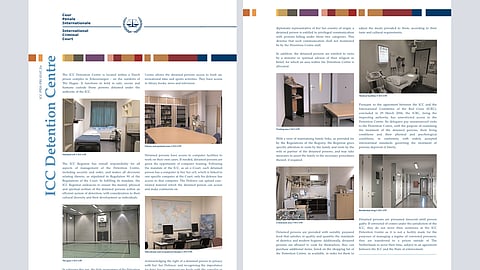
- NEWS
- the EDIT
- COMMENTARY
- BUSINESS
- LIFE
- SHOW
- ACTION
- GLOBAL GOALS
- SNAPS
- DYARYO TIRADA
- MORE

As former President Rodrigo Duterte faces the possibility of being turned over to the International Criminal Court (ICC) following an arrest warrant for alleged crimes against humanity, attention is now focused on the ICC Detention Centre in Scheveningen, The Hague — the facility where Duterte may soon be held.
The ICC issued a warrant for Duterte’s arrest in connection with his administration’s controversial war on drugs, which resulted in thousands of deaths, including alleged extrajudicial killings. If Duterte is transferred to The Hague, he would join a list of high-profile figures who have been held at the facility while awaiting trial for war crimes and crimes against humanity.
The ICC Detention Centre, located within a Dutch prison complex in Scheveningen, is known for providing secure but humane detention conditions, adhering to international standards. The facility is managed by the ICC Registrar, who is responsible for ensuring the mental, physical, and spiritual welfare of detainees.
Detainees at the centre are held under relatively comfortable conditions compared to conventional prisons:
• Private cells with modern facilities
Each detainee is housed in an individual cell equipped with a bed, desk, shelves, and a private bathroom. The cells have windows for natural light, and detainees are allowed to personalize their space within reasonable limits.
• Access to legal and computer resources
Detainees are provided with access to a computer linked to the ICC’s secure e-Court system. This allows them to review legal documents, communicate with their defense team, and prepare for their cases. The computer is restricted to legal work, and only the detainee and their defense team have access to the information.
• Recreational and Physical Activities
The facility includes a gym and a basketball court. Detainees are allowed regular access to outdoor recreation and fresh air, which is considered essential for maintaining physical and mental health.
• Educational and spiritual support
A library and a spiritual room are available for detainees who wish to read, study, or engage in religious practices. Detainees also have access to television, news, and other media.
• Healthcare and Medical Services
Onsite medical staff provide healthcare services, including mental health support. The ICC Detention Centre follows international health standards, and medical care is available to all detainees as needed.
• Family Visits and Communication
Detainees are allowed regular visits from family members and have the right to communicate with their country’s diplomatic representatives. Visits take place in designated visiting areas within the facility.
• Food and Cooking Options
Meals are provided according to dietary and cultural preferences. Detainees are also allowed to purchase ingredients and cook their own meals if they wish, using items from an approved shopping list.
Detainees are presumed innocent until proven guilty. If convicted, they are transferred to a state-designated facility to serve their sentence under an agreement between the ICC and the host country.
Notable figures held at the ICC detention centre
If Duterte is transferred to The Hague, he would join a list of prominent figures who have been held at the ICC Detention Centre while awaiting trial:
• Slobodan Milošević – The former President of Yugoslavia was detained at the Scheveningen facility while facing charges of war crimes and genocide. He died in his cell in 2006 before the conclusion of his trial.
• Thomas Lubanga – The Congolese warlord was the first person convicted by the ICC for using child soldiers in the Democratic Republic of Congo. He was sentenced to 14 years in prison in 2012.
• Charles Taylor – The former Liberian President was held at the facility while standing trial for war crimes and crimes against humanity related to the Sierra Leone Civil War. He was later sentenced to 50 years in prison.
• Radovan Karadžić – The former Bosnian Serb leader was held at the detention centre after being charged with genocide and war crimes during the Bosnian War. He was sentenced to life imprisonment.
Duterte’s potential detention at the ICC would mark a historic moment for the Philippines. If he is transferred to The Hague, he would become the first Filipino leader to face trial before the international tribunal. The case stems from allegations that Duterte’s war on drugs involved systematic human rights abuses, including the execution of suspected drug offenders without due process.
Duterte has consistently denied the allegations, maintaining that his anti-drug campaign was necessary to protect public safety. His legal team has not yet issued a statement regarding the potential transfer, but political analysts suggest that his detention could have significant implications for Philippine politics and its relationship with the international community.
While the ICC Detention Centre offers relatively humane living conditions, the political and legal weight of the charges Duterte faces means that his time in The Hague would be anything but comfortable. The case represents a significant test for the ICC’s ability to hold world leaders accountable for human rights violations — and for Duterte, it marks a dramatic turn in his political legacy.
